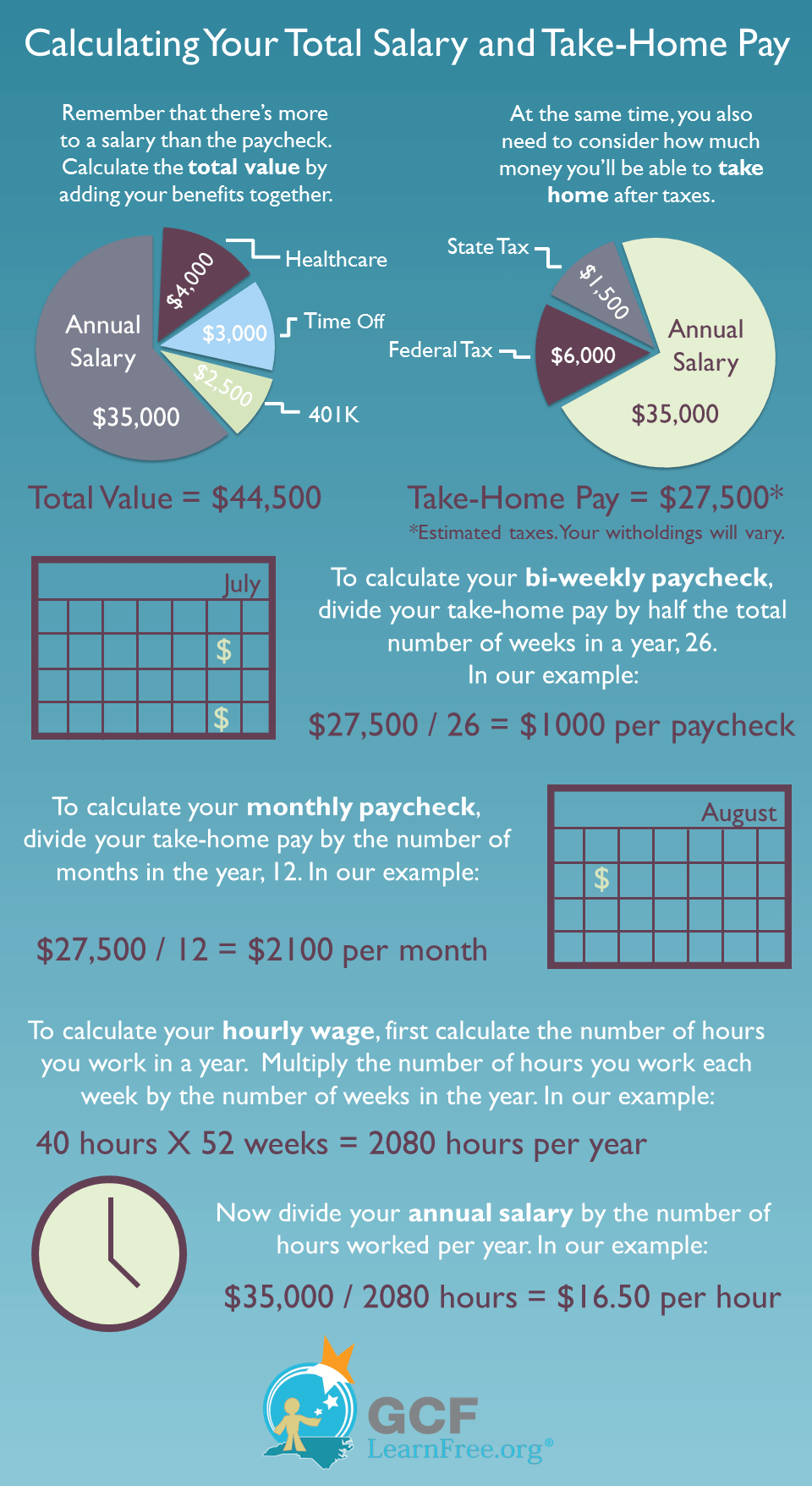
Career Planning and Salary
Salary Basics
Introduction

How much money will I make this year? Will I be able to pay all my bills? What about health insurance and retirement? You will need to think carefully about several different factors when researching salary information.
In this module, you'll learn about the importance of salary research. We'll also talk about different resources you can use to find salary information, calculate your take-home pay, determine your market value so you can negotiate a salary.
Why research salary information?
Without a clear understanding of the kind of salary you should expect from a career, you might find yourself pursuing a position that can't support your financial needs. In addition to basic salary information, you will also need to research the benefits associated with different careers, such as health insurance, retirement, and vacation time. Sometimes a competitive benefits package can be more valuable than a higher salary.
Even if you think you already know what to expect, consider that the global economic recession has seriously impacted salaries in almost every industry. Having the latest information can make a significant difference as you begin thinking about possible career paths.
Answering some of the questions below will help you to think about the type of information you need to gather as you begin researching different salaries:

- What kind of salary will I need to support my financial needs?
- What are the average and entry-level salaries for positions in the field?
- What about benefits, such as health care, retirement, and vacation?
- Are there educational costs to consider, such as tuition or student loans?
- Are there associated costs with my career choice, such as transportation, parking, or union dues?
- Will I need to relocate for a new career? What would that cost?
If you need additional help with assessing your financial needs, including how to plan a budget or manage your money, visit our Money Basics topic.
Salary research resources
Researching salary information used to be a difficult task, but several online resources have made the process much easier. Still, it's important to note that you should not depend too heavily on a single source as you conduct your research. Using multiple resources will give you a broader understanding of an industry and will allow you to develop more realistic expectations about the kind of salary you're likely to earn.
Try using some of the salary resources listed below:
- Salary.com is one of the most popular resources for finding U.S. salary information. Beyond basic salary information, the results include benefits and estimates of net or take-home pay.
Watch the video for a demonstration of Salary.com.
- MyPlan is a simple salary calculator for U.S. jobs that can provide you with a good starting point as you gather salary information about different positions.
- CareerOneStop allows you to see salary averages for different occupations as compiled by the U.S. Bureau of Labor Statistics. You can compare national salary averages against your location, see hourly wage rates, and more.
- GlassDoor is perhaps the most globally focused salary research tool available today. You can search for salary information at specific companies around the world and can read employee reviews to learn what it's really like to work for different employers.
Look up the average salary for an accountant using two of the resources above.
- Are the results similar, or do they vary?
- What is the difference between the average and entry-level salary?
- What could you expect to earn after gaining more experience in the field? Are there opportunities for salary growth and advancement?
Building realistic expectations
As you research salary information for different careers, be sure to think about all of the variables involved in a salary estimate. If you're not careful, you might end up with unrealistic salary expectations, which can do more harm than good. For example, while the average salary for a position might be $40,000 per year, you shouldn't expect to earn that much if you're just starting a career in the field.
Total salary and take-home pay
As you research salary information, it's important to keep everything in context. Be sure to think about the total value of a salary by including benefits. You should also consider how much money you'll be taking home after taxes. By spending just a little extra time, you can make sure a salary will truly meet your financial needs.
Review the infographic below to learn more about calculating realistic salary expectations.

Determining your market value
Once you have a solid estimate of what you will likely earn in a given career field, you can begin assessing your own market value. Your market value is a more exact estimate of what you can expect to earn when entering a career. Your market value is determined by your experience, education, skills, and other assets you can bring to an employer.
Watch this video from Monster UK to learn more about determining your market value.
Answer some of the following questions as you begin to determine your market value:
- Are you qualified for an entry-level position or something more advanced?
- What is your current level of education? What is expected for different positions in the field?
- Do you have any special skills that make you more valuable than other job seekers?
Salary negotiation
If you're offered a new position, it's time to put your research into action. Make sure you're being offered a salary that is fair and competitive. If you believe the offer is too low, cite your knowledge about average salaries in the industry and your own market value. Remember that some employers simply may not be able to offer you the salary you want, but there's no harm in trying to negotiate.
Watch these videos from Monster UK and CareerBuilder to learn more about how to negotiate a salary.
If you find yourself in a position to negotiate your salary, try following these simple rules:
- Don't rush through the process—ask for time to consider any salary offer.
- Be prepared to provide a salary figure that you expect to earn. This should be based on your research and your market value. Bring along some information to back up your statements.
- Remember that you can negotiate for more than just your base salary. Consider asking for additional benefits or vacation in the negotiation process.
- Determine who holds the "position of power", you or your potential employer. If the company has other candidates it could hire instead, asking for a higher salary could be risky. If you know you're the only person being considered for the job, you're in a good position to ask for a larger salary.
